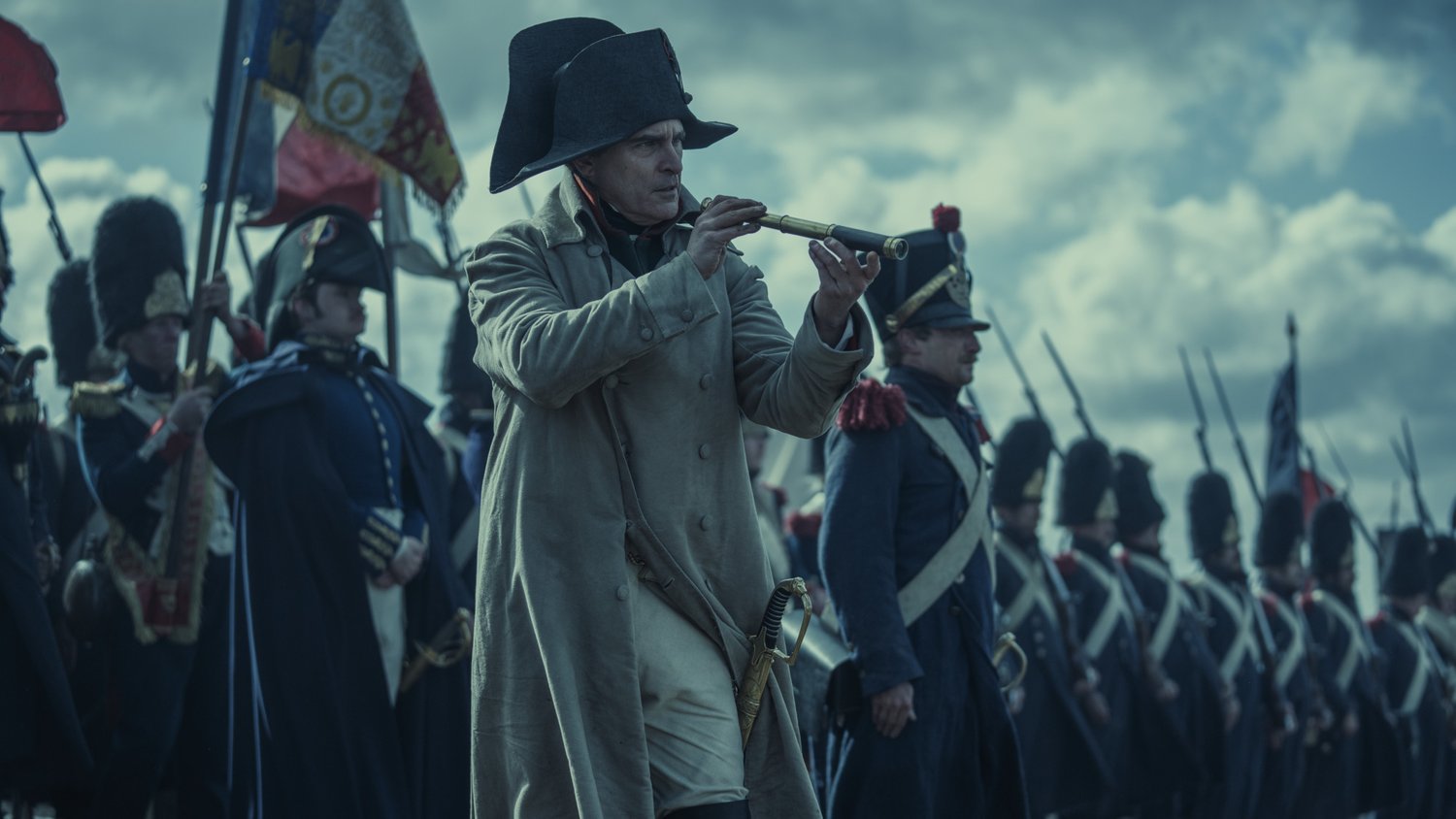Images courtesy of Sony Pictures
NAPOLEON– 2 STARS
Former French emperor and military commander Napoleon Bonaparte is one the most widely recognized and referenced figures in all of world history. Evoking his name– especially for the first-name-only Napoleon from one of Hollywood’s foremost epic movie specialists Ridley Scott– brings up universally accepted benchmarks of familiar imagery and personality. Let’s talk about that for a moment as a measuring stick for Scott’s paunchy new film.
LESSON #1: THE PERSONALITY OF NAPOLEON BONAPARTE– One personality profile of Napoleon frames a transfixing and titanic figure of a man. He was an extroverted orator, a political mastermind, a quick thinker rich with big ideas, and a calculated strategist with off-the-charts confidence. Ignoring his signature short height, those traits require casting one hell of an actor for any kind of biopic.
Comparing the historical subject’s profile to the resume of the chosen actor, Joker Oscar winner Joaquin Phoenix was an inspired choice for this meaty role. With the right push and material, he can check any of those boxes of Napoleon’s personality criteria for any given scene. At this stage of his career, Joaquin Phoenix can also shoulder a lofty blockbuster. Reuniting with Ridley Scott 23 years after his breakout performance as Commodus in Gladiator felt like a second match made in heaven.
Shockingly and woefully, Joaquin Phoenix does not achieve a single one of those aforementioned personality traits of Napoleon Bonaparte to any compelling degree. You read that right– not a single one of them. There’s no sweeping speech destined for an Oscar nomination clip that wins over citizens, soldiers, or us viewers. Big political ideas pop without sparks. The fireworks and cunning strategy never make it off the battlefield, and any legendary swagger is reduced to the snivels of a lazy and insecure cuckold.
LESSON #1: WHAT DESTINY BRINGS– There’s one throwaway scene where Joaquin Phoenix actually brings full vigor to the role. Throughout most of the movie, Napoleon has spoken of destiny being the source of his victories and status. Coming home from a battle to sit at a dinner party across from his adulterous wife Joséphine, played by Pieces of a Woman Best Actress nominee Vanessa Kirby, Bonaparte goes on a diatribe of his trumped-up providence. He extols that “destiny has brought” him freedom, success, an empire, a wife, and, lastly, a lamb chop— which he slams on his plate to emphatically make his point.
This sliver of a moment in a 157-minute movie is the most animated and semi-intentionally hilarious Joaquin Phoenix ever gets. There are 154 more minutes, let alone what’s in the rumored 4-hour director’s cut, that could have used that kind of maniacal pep. It is downright strange to see the normally enigmatic and beguiling actor, the brawny director in charge, and this type of prominent subject matter miss so poorly. Destiny shouldn’t have brought Napoleon.
LESSON #2: WELCOME TO FRENCH HISTORY 104– Starting with a recreation of the guillotined execution of Marie Antoinette on October 16, 1793, Napoleon stomps on some and tip-toes through other selected moments of French history (curated by The Last Duel’s historical advisor Lorris Chevalier) from this event until the man’s death in 1821. Screenwriter David Scarpa (All the Money in the World and the upcoming Gladiator 2) provides labeled intertitles and narrated letters that establish the players, dates, and settings for the scenes at hand. It’s then up to the trivia nerds out there and those who paid attention in their high school and college history classes to elbow the rest of us watching Napoleon when something important is about to happen.
The treatise of history Napoleon attempts by way of encyclopedia hopscotch can be sorted by his public operations and his personal actions in private. In the national theater of war and politics, Napoleon’s siege victory at Toulon in 1793 promoted him to Brigadier General and a level of public respect independent of the old regime from the preceding Reign of Terror period of violence. His rising power would continue through military dominance against royalist insurrection in 1795 and foreign campaigns in Egypt in 1798 before engineering a coup in 1799. To consolidate power, Napoleon crowned himself Emperor of the French in 1804 before turning his armies and attention to international rivals in Austria, Russia, and England.
LESSON #3: THE LOVE BEHIND POWER– Off his horseback place of leadership, Napoleon met the fetching Joséphine de Beauharnais at The Survivor’s Ball in 1795 and married her the next year. Despite her wandering eye and open bed for other suitors, Bonaparte would fall madly in love with the feisty widower and desire her acceptance even against his jealousy. Their downfall would ultimately be her inability to provide him with a male heir to the throne before their 1810 divorce and his new marriage to Austrian archduchess Marie Louise. Again, maybe you can invite your old teacher or profession to share popcorn in the seat next to you to sort this all out.
When Napoleon is in battle mode, the movie hits impressive strides. Cinematic combat has always been one of Ridley Scott’s highest and most proficient areas of expertise, and the director loves his regular Malta workplace for the room to clang-and-bang some bloody action. The Loki team of fight coordinator Cali Nelle and stunt coordinator Nikki Powell deserve high marks for the physicality of these massive reenactments– particularly the icy Battle of Austerlitz– charted by 1917 military advisor Paul Biddiss. Partnering with his trusted cinematographer Dariusz Wolski (ninth time) and production designer Arthur Max (15th time), Scott’s kinetic momentum is driven by the stark visuals and blistering sounds of thunderous cannons and strafing cavalry charges (credit Wonder Woman 1984 horse master Camilla Naprous as a hidden MVP) in unique battlefield confrontations that bring the movie to life.
Those will be the scenes in Napoleon you fast-forward to on AppleTV+ because– away from the uniforms, muskets, artillery, and swords– anything involving a lover or a crown fails to be persuasive of most any captivation. This is where the tedious and unsupported soap opera trying to flesh out the man “accused of egotism and a lack of simple good manners” takes over Napoleon. The booming choral score of composer Martin Phipps (The Crown) evaporates to a weak flute motif, and scenes that should showcase the intellect and ignite sources of passion within the famous sovereign plod by, like the lead actor, with wincing disinterest.
LOGO DESIGNED BY MEENTS ILLUSTRATED (#1159)



